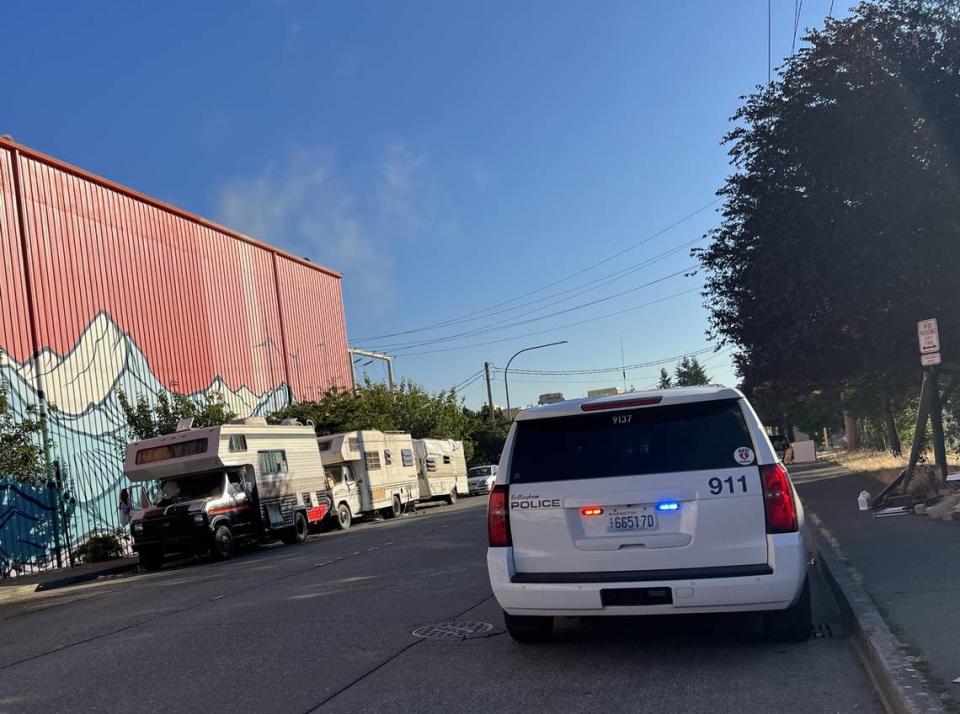Bellingham cracking down on campers and RVs parked around the city by unhoused dwellers
Even as Bellingham officials are seeking a supervised place to park for the growing number of people who live in cars and RVs, city workers are posting signs to restrict the hours of parking in some places and police continue to enforce a 72-hour limit in others.
What remained of a three-year RV encampment was removed from Cornwall Avenue in late August, and parking was banned in advance of a planned project to add bike lanes from downtown to a park under construction at the south end of the street.
Most recently, eight-hour parking signs were posted on Moore Street near Carl Cozier Elementary School and the Arne Hanna Aquatic Center, but several RVs and car campers remained there this week.
Those two locations are among several RV encampments that have drawn criticism about drug use, crime and litter at public meetings, in emails to The Bellingham Herald, and on social media over the past several years as homelessness grew during the coronavirus pandemic.
“The intent was to incrementally and slowly implement the change. This slow and deliberate process was purposely done to avoid acute impacts to persons living in vehicles and provide ample time to find alternatives to being towed,” Eric Johnston, director of the Public Works Department, said in a statement.
No one answered the city’s call for a place to park cars and RVs and an organization to operate a such an encampment, Bellingham spokeswoman Janice Keller told The Herald.
A deadline for proposals was Aug. 16, Keller said.
Parking restrictions — plus frequent harassment from police and the public — make it difficult for those who live the nomad lifestyle, said Tony Plunk, who’s been living in a surplus U.S. Air Force bus.
“I didn’t come here looking for a fight. I know I’m sometimes over the (72-hour parking) limit. I just got stuck here,” Plunk told The Herald.
A retired truck driver and highway department worker, Plunk said he arrived from Tennessee on his way to Alaska just before the pandemic, couldn’t afford the $4,500 ferry passage, and got stuck in Bellingham when the U.S.-Canada border closed.
“Stop treating me like a criminal because I’m homeless and live on the street,” he said.

More people live in cars
Plunk is among at least 84 people who are living in vehicles without a toilet, shower or running water, according to Whatcom County’s annual report on homelessness.
That Point In Time Count of homeless people showed that 1,059 people were homeless in Whatcom County, including those in shelters, motels and other housing.
It was the highest number ever recorded locally, and a 27% increase from 2022.
Rising homelessness nationwide is being driven by the skyrocketing cost of housing, according to research by nonpartisan think tanks and the U.S. Government Accountability Office, which found in 2020 that a $100 increase in median rent was associated with a 9% increase in homelessness.
It’s made worse in Bellingham because of a vacancy rate of around 1%.
Rents keep rising
Online rental platform Zumper showed the average rent for a one-bedroom apartment in Bellingham was $1,500 in September, a 16% increase over 2022. A one-bedroom apartment went for $1,000 in 2018.
Median rent for all size units and property types in Bellingham is $2,150 in September, up $175 from 2022, according to the real estate website Zillow.
Rent prices reflect the cost of homes, according to Redfin, which reported that the median Bellingham home price in July was $558,000, down 9% from 2022.
According to Rent Cafe, the cost of living in Bellingham is 4% higher than the state average and 20% higher than the national average.
In its “Out of Reach” report this year, the National Low Income Housing Coalition said that Washington has the fifth highest “housing wage” in the country, requiring renters to earn $36.33 an hour or work 92 hours a week at minimum wage to afford the average two-bedroom apartment.
According to a 2021 report by the United Way of Washington, 40% of Whatcom County households qualify as working poor and spend a larger part of their earnings on housing. That was up from 24% in 2019.

